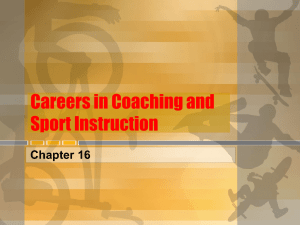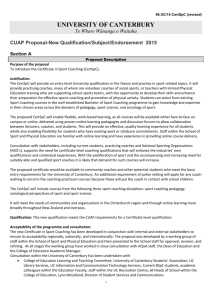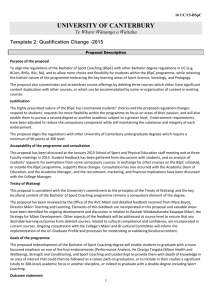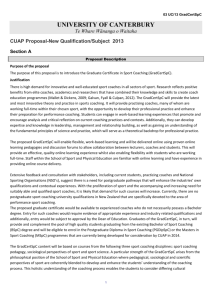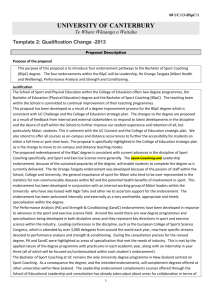Sports Coaching
advertisement
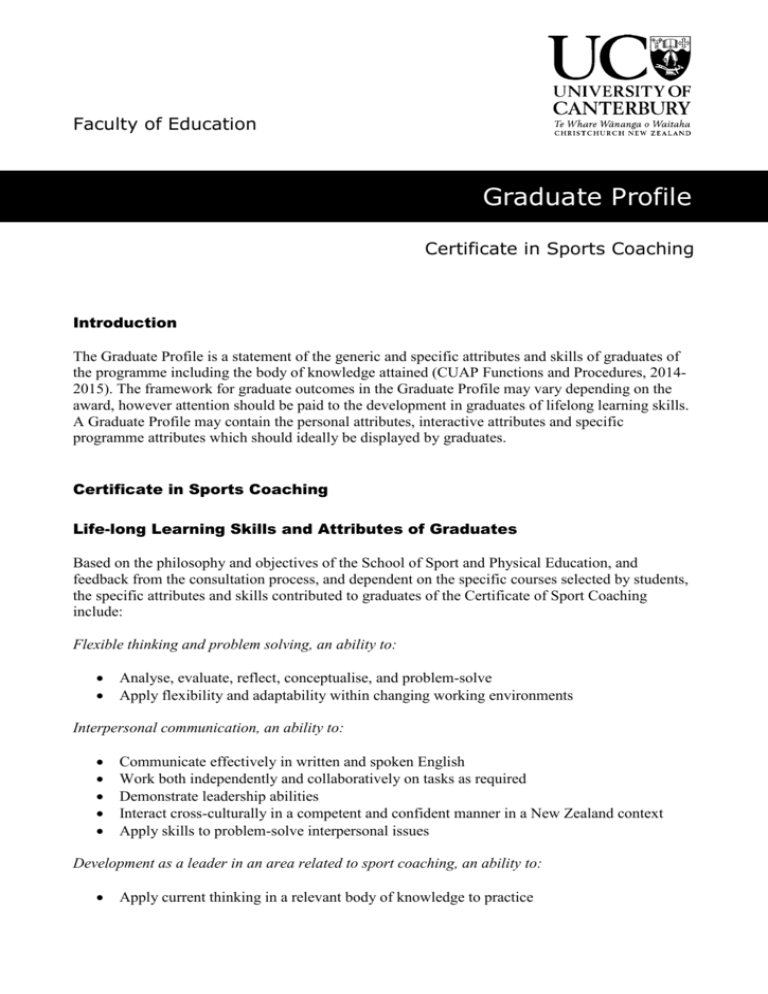
Faculty of Education Graduate Profile Certificate in Sports Coaching Introduction The Graduate Profile is a statement of the generic and specific attributes and skills of graduates of the programme including the body of knowledge attained (CUAP Functions and Procedures, 20142015). The framework for graduate outcomes in the Graduate Profile may vary depending on the award, however attention should be paid to the development in graduates of lifelong learning skills. A Graduate Profile may contain the personal attributes, interactive attributes and specific programme attributes which should ideally be displayed by graduates. Certificate in Sports Coaching Life-long Learning Skills and Attributes of Graduates Based on the philosophy and objectives of the School of Sport and Physical Education, and feedback from the consultation process, and dependent on the specific courses selected by students, the specific attributes and skills contributed to graduates of the Certificate of Sport Coaching include: Flexible thinking and problem solving, an ability to: Analyse, evaluate, reflect, conceptualise, and problem-solve Apply flexibility and adaptability within changing working environments Interpersonal communication, an ability to: Communicate effectively in written and spoken English Work both independently and collaboratively on tasks as required Demonstrate leadership abilities Interact cross-culturally in a competent and confident manner in a New Zealand context Apply skills to problem-solve interpersonal issues Development as a leader in an area related to sport coaching, an ability to: Apply current thinking in a relevant body of knowledge to practice Analyse and evaluate own performance and take responsibility for ensuring quality outcomes Provide an inclusive and supportive environment for sporting participants in a range of settings Develop a commitment to lifelong learning and development Work within and apply administrative policies and procedures in a range of community and/or school sporting settings Work effectively within a multi-cultural environment Alignment with the UC graduate profile Produce students who are biculturally competent and confident: One of the core courses, SPCO101 contains explicit bicultural content towards enhancing bicultural competence of our students. In addition, students may opt into the further course, SPCO208, Critical and Bicultural Perspectives in Sport Coaching, to further enhance their bicultural capabilities and understandings. Produce students who are engaged with the community: One of the core courses, SPCO101 includes supervised micro coaching sessions with local schools which provides contact and experience with the wider community. Other optional courses include interaction with community organisations such as Sport Canterbury, Sports in the Park, organisations running Special Olympics programmes. Most courses in the Bachelor of Sport Coaching schedule have a strong focus on community sport provision and coaching. Produce students who are globally aware: Courses in the Bachelor of Sport Coaching schedule address international issues, from multicultural understandings to practises in different nations, and examples of sporting practice which are internationally observed. Produce students who are innovative and work-ready: A particular strength of the Bachelor of Sport coaching programme, from which CertSpC students will select courses, is the development in students of transferrable skills which are immediately valuable in the professional workplace. This is in the form of presentations for course assessments, developing team-working and communications skills (this is one form of assessment featured in SPCO101, Introduction to Sport Coaching, as well as in other courses). In optional practicums, students work within schools or sporting organisations to gain an understanding of professional practice honing communication and leadership skills, and other courses deal with interpersonal communications, planning, and group management. 2






